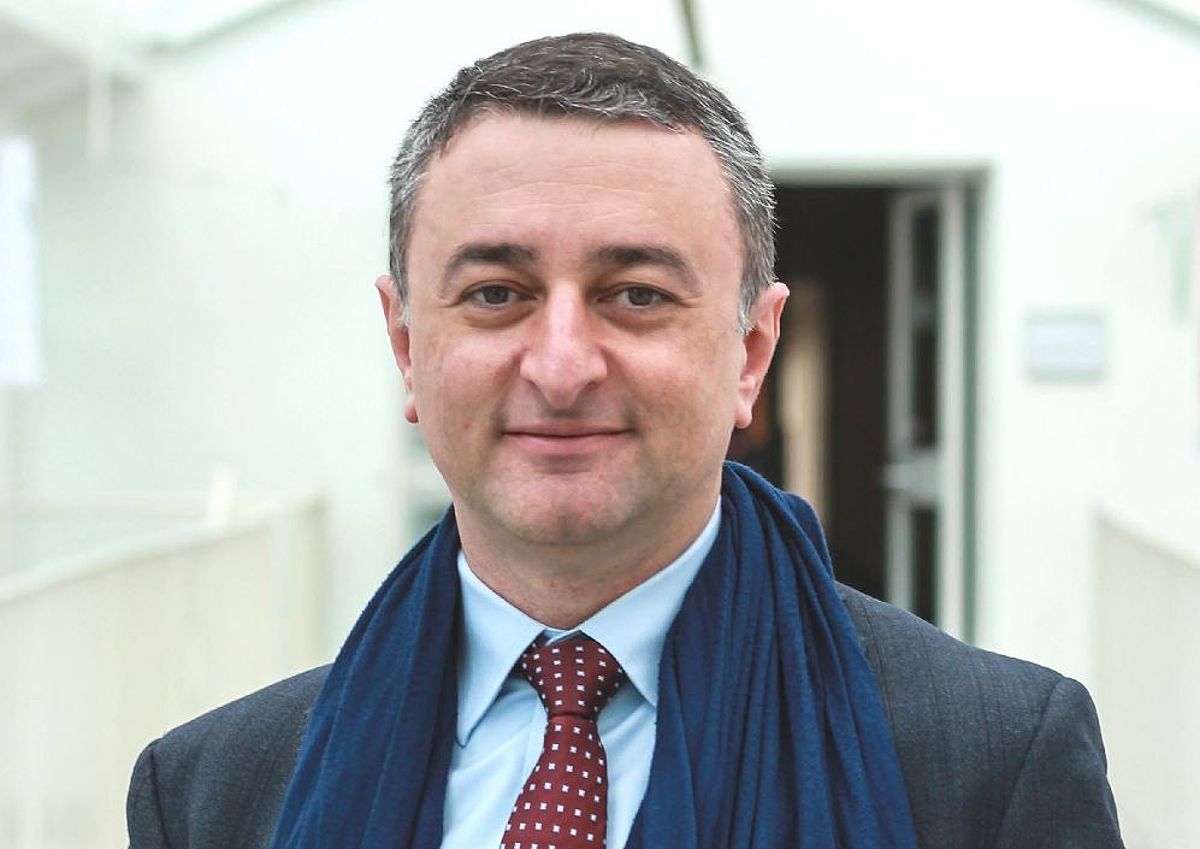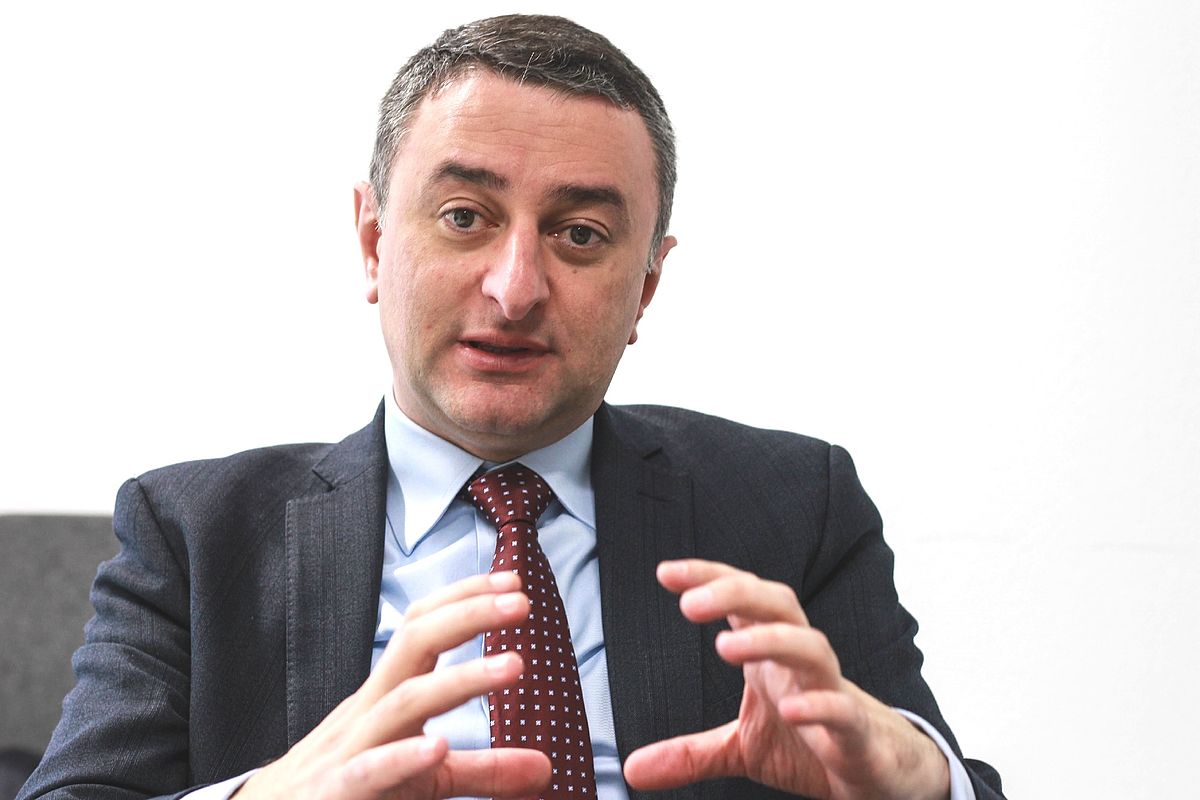‘Life is too short to limit yourself to a single playground’
Dr Vinicius Mariano de Carvalho, alumnus of the University of Passau and lecturer at King's College London, spent 10 days in Passau in May 2019. By invitation from Professor Malte Steinbrink, Chair of Human Geography, the Brazilian took part in the international programme for guests scholars of the Faculty of Arts and Humanities. In the interview, he describes his special relationship with Passau, the benefits of an eclectic CV and the reasons for Bolsonaro's electoral success.
After your promotion to Chair of Romance Literature and Cultures and exodus from Passau in 2006 you have come back to visit many times. What is it that keeps drawing you back here?
I spent the best years of my life in Passau. This period, in which I acquired my doctorate and taught at the University of Passau, was relatively short. But it decisively changed my outlook on life, both personally and professionally speaking. So spending a few days in Passau means much more to me than simply visiting a familiar city. It is returning to a place that helps me recognise the things I need to change in my life. The experiences that I had in Passau, and the decisions that I made here, had a huge impact on me, and on my life.
What particular influence did the University of Passau have on you?
A significant one, to be sure. During my doctorate, I had the opportunity to let my creativity run free. And the best part was that creativity was valued at the university. With that came the feeling of being part of a community. The moderate size of the university and the city make it relatively easy to feel a sense of community. To be part of a group and to be able to share things that are important to you, that is something wonderful.
To be open to the change in academia and the world in general is something that I took away from my time at Passau.
Dr Vinicius Mariano de Carvalho
Since you completed your doctorate the University of Passau has undergone some changes. You too have shifted your focus in the meantime: your work is no longer centred on literature and theology, but on urban violence, questions of public security, UN peacekeeping missions and, last but not least, Brazilian military music. How did this come about?
I think that this change can also be attributed to the spirit of the University of Passau. As I began to work on my doctorate and teach here, through the International Cultural Business Studies degree programmes, it became clear to me how important it is to work in an interdisciplinary way. To be open to the change in academia and the world in general is something that I took away from my time at Passau. This attitude has helped me time and again to make any necessary changes and realign my focus.
Upon the invitation of Professor Dr Malte Steinbrink, I spent ten days here as a guest scholar at the University of Passau. You gave a lecture on the ‘pacification’ of favelas in Rio de Janeiro and gave an excellent performance of some Brazilian music alongside Sturmberger Feiertagsmusi. The ScharfrichterHaus is an unusual location for university events. Usually it plays host to cabaret artists and comedians. How did you feel being on this stage?
The ScharfrichterHaus is deeply connected to my time in Passau. I spent many hours of my life there, not just standing at the bar, but on the stage too. My goal here was to tear down the walls between the university world and the world outside it. To be on this stage again was a good feeling for me. It was a reflection on what defines this city and this university, namely the ability to maintain a dialogue between performance and research. In academia, we are always eager to open doors. Unfortunately, they often remain shut. When we as academics appear at a place such as the ScharfrichterHaus, we are approaching a different audience, an audience that has a right to be properly entertained and to find out what is being researched at the university.
It wasn't just your talk that was enjoyable, the presentation of your career by Malte Steinbrink was pretty entertaining too. He expressed a sense of confusion at the variety of occupations, titles and topics that are to be found in your biography. After all, you aren't just a scholar. You also trained as an electrician and were well on your way to becoming a Catholic priest before you then turned your attention to literature. And that's not all: later you served in the Brazilian army, were deployed as a military observer for the UN and served as a conductor in various orchestras. Does it make any sense to search for an underlying theme in your biography?
Difficult to say. I have never had a clear and explicit professional goal. I think the one constant in my life is the desire to discover new things. Even if it sounds like a bad caption from a calendar, I am convinced of one thing: Life is too short limit yourself to a single playground.
So this is the reason for the variety of occupations and topics?
Yes, I never wanted to restrict myself to a single field. Curiosity is what drives me, and I owe a great deal to this curiosity: my training as an electrician gave me an insight into a systematic way of thinking, which was useful, for example, for my work as an orchestral conductor. That job in turn, helped to better understand how groups function and which dynamics could develop in this context. To put it concisely: I think that all the occupations listed helped me to approach things in a more holistic fashion.
Back to the topic of your talk: what is the current situation in the favelas in Rio, which were ‘pacified’ in connection with the 2014 Football World Cup and the 2016 Olympic Games?
In virtually all quarters of Rio in which pacifying police units were deployed, we are seeing a return of the drug dealers and violence, and this to a similarly high level to that prior to the so-called ‘pacification measures’. On the state side, a significant amount of money and energy was invested here, without however taking into account the, at times, very different living environments in Rio's favelas and without involving the inhabitants in the pacification measures. It was assumed that a single model could be applied to all favelas. The results show that this approach does not work and there is no simple solution to the complex phenomenon of violence in favelas.
Many people who live in favelas have absolutely nothing to do with the drug trade. They often live in these informal dwellings because they cannot afford the rent in other areas of the city. Are you hopeful that their day-to-day lives will improve in the foreseeable future?
Of course not all of them are involved in the drug trade. Drug dealers make up a very small fraction of the population in the favelas. But they have the power there, because they have a monopoly on violence and threaten the rest of the population. Historically speaking, this population has always been marginalised and neither socially nor politically integrated to any meaningful extent. The integration of these people will not be easy, because change is not just required in the favelas, it is required across all of Brazilian society, a society that is currently much divided.
Bolsonaro's victory is a symptom of the phenomena that unfortunately are still very prevalent in Brazilian society: racism, sexism, machismo and homophobia.
Dr Vinicius Mariano de Carvalho
Owing to his homophobic and racist statements, in addition to those glorifying violence, Jair Bolsonaro's election to the office of the President of Brazil appalled many people, especially in Europe. Were you surprised by Bolsonaro's electoral victory?
If I am honest, it didn't surprise me. Bolsonaro's victory is a symptom of the phenomena that unfortunately are still very prevalent in Brazilian society: racism, sexism, machismo and homophobia. As long as this doesn't change, politicians like Bolsonaro will come to power and keep it. He knew how to present himself as the representative of a ‘new politics’.
He has been a member of parliament for quite a few years...
Yes, but he plays with this image of not being a politician or rather not being a regular politician. I am absolutely convinced that it is not politics that change society but vice versa. If there is no change within society, the political leadership will stay the same.
In your article, which appeared in the Washington Post shortly after the 2018 presidential elections, you reference the all-pervasive conservatism and the visible, decades long, dynastic reproduction of the political elite. Who could be the initiators of change? What powers could turn Brazil into a more progressive country?
That is the million dollar question. Joking aside: I think that Brazil's transformation must begin in small structures. We should return to representative bodies, citizen's initiatives and social movements, who understand their role in society and seize upon this with increasing vigour. After the military dictatorship, the population in Brazil very effectively organised itself into unions, associations and citizen's initiatives. Public participation in the constitution of 1988 was phenomenal because of the existence of these small units. Unfortunately they became weaker after this and lost their transformative power.
At King's College London, you not only work in the Brazil Institute, you are active in the Department of War Studies too. It is difficult to imagine such a title in the context of a German university. In England, there doesn't appear to be a problem in making war the topic of research.
Unfortunately, war and conflict are a constant reality in human history. There has never been a long period in the history of the world free from warring disputes of some kind. Of course, you can also approach this topic from the perspective of peace research. However, the approach of the Department of War Studies seems to me to be a genuinely pragmatic and interesting one. It consists of identifying the existence of wars or conflicts, objectifying them and researching their various aspects. So, not simply looking at a strategic and operative perspective, but also looking at their depictions in art, for example.
Did your first time as a visiting international scholar at the University of Passau give you the desire to visit the city again?
Absolutely. I think and hope that my special relationship with Passau and the university will continue. I have been able to realise many of my ideas and dreams here, which is wonderful. I hope that during this visit Malte Steinbrink and I have sown the seeds for the implementation of further partner projects and the intensification of the relationship between the University of Passau and King's College. Ultimately this is the task of us academics: to build bridges and enable dialogue.
This interview was conducted by Dr Benedikt Kuhnen
Professor Malte Steinbrink †
How can we explain the geographical dimensions of social inequalities?
How can we explain the geographical dimensions of social inequalities?
Professor Malte Steinbrink was holder of the Chair of Social and Cultural Geography. This social and cultural geographer was a member of the interdisciplinary Institute for Migration Research and Intercultural Studies (IMIS) and a Senior Research Fellow at the University of Johannesburg (South Africa). His research interests included geographical development, migration and tourism research and empirical scientific observation.





